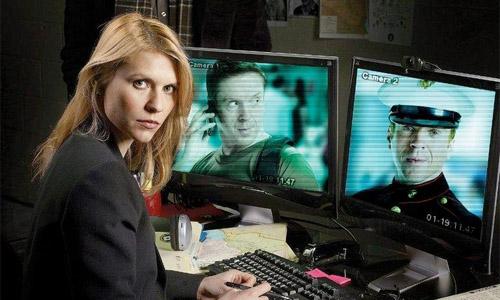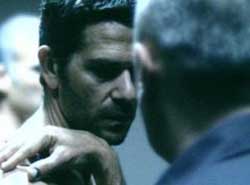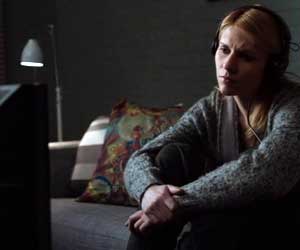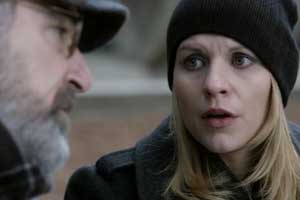 Showtime's Homeland, a new drama series about a returning POW and the CIA agent who suspects him of having gone over to the enemy, is based on an Israeli series, but producers have made this Americanized version all their own. And, thanks to a superb cast and a brilliantly fresh approach to storytelling, they've also made it a better TV series than anything the broadcast networks have turned out this fall...
Showtime's Homeland, a new drama series about a returning POW and the CIA agent who suspects him of having gone over to the enemy, is based on an Israeli series, but producers have made this Americanized version all their own. And, thanks to a superb cast and a brilliantly fresh approach to storytelling, they've also made it a better TV series than anything the broadcast networks have turned out this fall...

Homeland, which premieres Sunday night at 10 ET, is inspired by the 2010 Israel series known internationally as Prisoners of War (in Hebrew, the show was called Hatufim, which translates as Abductees). In that version (seen at right), three Israeli reservists were captured in Lebanon, and returned 17 years later -- one dead, two alive. The drama was about the reintegration of the POWs into society, and their respective families, whose own lives are disrupted by the unexpected return of their loved ones.
Most U.S. television series adapted from foreign sources, from the early days of All in the Family (based on England's Till Death Us Do Part) to the more recent Ugly Betty (from a Colombian soap opera) and In Treatment (like Homeland, based on an Israeli drama), make the migration once the original series have been produced and televised. Rights to an Americanized Prisoners of War, unusually, were optioned even before that series began filming, by a savvy veteran TV producer who was informed of its development, and instantly saw its potential.
That producer was, and is, Howard Gordon, the show-runner of Fox's 24 who saw, in what would become Homeland, the chance to cover familiar territory -- the sacrifices of heroism, the threats of terrorism, and the murky grey area of high-level government investigations -- at a different pace, and in a very different way.

In Homeland, the returning POW is Marine Sgt. Nicholas Brody, a sniper specialist missing and presumed killed since being captured in Iraq in 2003. Brody is played by Damian Lewis, an electrifying actor that's long earned raves from me, for NBC's Life, HBO's Band of Brothers, and the imported dramas The Forsyte Saga and Friends & Crocodiles. Here, he embodies, and amplifies, what may be his most multi-layered and challenging character yet.
Brody, eight years after his initial capture, suddenly surfaces, discovered in a locked cell during a high-risk raid similar to the one that located and killed Osama bin Laden. He's brought home to a hero's welcome, and begins the hesitant, emotionally complicated process of trying to reconnect with his wife (played beautifully, in more ways than one, by Morena Baccarin from V and Firefly). Flashbacks slowly reveal the horrors Brody endured, making the past constantly intrude upon Brody's already shaky present.
Had Homeland stuck to this part of the story, it would have been, basically, a remake of Prisoners of War. Instead, Showtime's Homeland is a wholesale reinvention, thanks to the introduction of a new central character, and a new pivotal plot.

The new character is CIA officer Carrie Mathison, a former rising star whose zealous and unorthodox investigative techniques -- think 24's Jack Bauer, with more time and less testosterone -- have made her an outsider within her own agency. She's portrayed by Claire Danes, who, despite her years as a Hollywood movie star, now finds that her three best roles have all been provided by the small screen: her breakout role as a coltish teen in ABC's My So-Called Life, her stunningly acted, Emmy-winning title role in HBO's Temple Grandin... and now this.
Carrie is a complicated character not only because she's obsessive and a maverick, but because she's got a bipolar disorder -- which she keeps secret from the CIA, because it would end even what's left of her career. Carrie, before she was pulled from active duty in Iraq, got vague but troubling information from a source that "an American prisoner of war has been turned." When Brody literally surfaces from underground captivity, she suspects he's actually a double agent now working for Al-Qaeda -- and does everything she can to prove it.
Without proper authorization, she sets up video and audio surveillance in his home, taps the phones, and shadows his every move. If her suspicions are correct, Carrie is the hero of Homeland. If she's wrong, she's one more unfair torture the story's real hero, Brody, must struggle to endure. But which is it?
For a while, we don't, and won't, know. And that's the narrative gimmick that makes Homeland so fascinating -- and, for television, so unusual it may well be unique. Both Danes and Lewis are singularly compelling and charismatic performers, so we want to root for them both. But for now, at least, our loyalties are torn, and uncertain.
Wiseguy and EZ Streets were two of the very few TV series that dared to ask us to empathize with both the investigator and the suspect -- but even in those landmark dramas, we always knew the good guys from the bad guys. It's the very elusiveness of what's right and wrong, in Homeland, that makes it linger so long afterward, just as the threat and fear of a new terrorist attack makes it as resonant in 2011 as 24 was when it premiered just three months after 9/11 a decade earlier.

The talent on view in Homeland is impressive. Mandy Patinkin returns to TV as Saul, one of the few CIA handlers who hasn't abandoned Carrie, and David Marciano, a favorite since Due South, plays an investigator rogue enough to work with Carrie even on the installation of unauthorized surveillance equipment.
The dramatic complexity, and beauty, regarding this illicit surveillance is that Claire is alone in her world, watching Brody alone in his. She alone -- and she, alone -- sees him curling up into a protective fetal position in a corner, and releasing all manner of mixed emotions when attempting to rekindle sexual relations with his wife. More than once, Claire is so upset by what she sees that she turns away. But we viewers, complicit in the voyeurism that may or may not be justifiable in a larger sense, keep watching.

The intimate bedroom scenes in Homeland are bravely, disturbingly raw and emotional. You see, in the eyes of Baccarin's Jessica, her sad revulsion at her husband's unexpectedly forceful lovemaking -- mental scars to go with his physical ones, when he was tortured by his captors. In a subsequent episode, the pressure here continues to build, as does her increased concern as he reveals more about what he wants from her, and doesn't want, during their sexual liaisons. In such moments, the "real" Brody seems to reveal itself -- but who is he, and who's left, and why?
The performances in Homeland are marvelous, but so are the scripts and conflicts. For that, give credit not only to executive producer Gordon (whose quality credits, besides 24, include Buffy the Vampire Slayer, Angel and the upcoming midseason entry, the intriguing NBC drama Awake), but to his collaborators.
Alex Ganza, another 24 writer-producer, also worked on The X Files and the sweet 1998 summer series starring Beau Bridges, ABC's Maximum Bob. Michael Cuesta, who directed the pilot, also did the same for Showtime's Dexter. And yet another Homeland executive producer, Gideon Raff, is creator of the original Israeli Prisoners of War, aiding with accuracy in portraying the various overseas characters and locations.
I've raved on long enough. Watch Homeland Sunday night, and tell me whether you're as impressed, and as hooked, as I am.